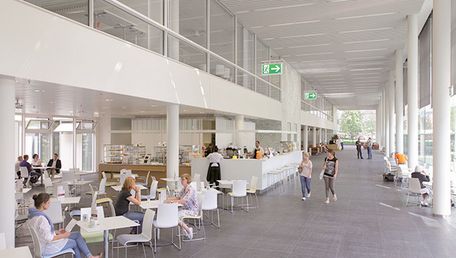Emphases
Key treatment areas
- Diagnostics and psychotherapeutic treatment of psychological/psychosomatic disorders
- Diagnostics and consultancy for stress caused by critical life events
Key research areas
- Psycho-physiological affect
- Psychotherapy
- Epidemiology and prevention of psychological/psychosomatic disorders
The field of psychosomatics deals with disorders involving an interaction between the mind (psycho) and the body (somatic). This category includes all disorders in which mental influences cause or at least influence the genesis of the disease and play a significant role in the course of the development of the disease.
For example, this includes stress-related or stress-dependent disturbances or physical complaints with no underlying organic cause. Various other phobic disorders, disturbances in human relationships, impaired self-esteem, eating disorders, addictions, and depression are classified as diseases for which the causes are either partly or wholly psychosomatic.
Psychosomatic medicine is not concerned only with the disorders themselves, but also with issues of handling of the disease. For disorders that require a particularly radical intervention in the life of the patient, the Institute offers its support. This is customary in chronic diseases such as Diabetes mellitus and tumor diseases. Frequently, these patients and/or their families need the targeted help of a psychotherapist trained in the treatment of psychosomatic disorders.
Patient care
The range of services offered by the Institute is oriented towards the patients of the University Clinic as well as the students and employees of the Heinrich Heine University. The core element in the provision of clinical services is the psychosomatic counseling of patients. The counseling session between patient and psychotherapist originates either upon independent request or at the suggestion of the treating physicians in all stations at the clinic.
The initial discussion with the patient affected by psychosomatic complaints is the start of the treatment. Counseling is initiated or a treatment recommendation is made in coordination with the clinic station involved in the treatment of the patient. If continuing counseling is needed, the patient receives support in the search for an appropriate therapy center.
Crisis counseling is an essential component of the Institute’s responsibilities particularly for patients currently in difficult life circumstances such as following diagnosis of serious illness or in the management of a chronic disease, pre-operative counseling and diagnostics, or impending organ transplants. This also includes counseling of family members who generally are equally affected by such interventions. Counseling services offered by the Institute range from psychoanalysis to depth psychology and behavioral therapy to relaxation techniques such as autogenous training or progressive muscular relaxation according to Jacobsen.
The Institute provides service not only to patients but also to employees of the University and the University Clinic. For psychosomatic complaints, these employees can also obtain an initial diagnostic discussion or counseling in professional or personal crisis situations and also receive suggestions for therapy options and support in the search for an appropriate counseling center.
The third group of service recipients is the students at the University of Duesseldorf. Counseling is available to students for personal difficulties or problems related to their studies, such as text anxiety, or for private crisis situations or psychosomatic complaints. In addition, a special group therapy geared toward the interests of students is also available.
Research and teaching
Core research elements at the Clinical Institute for Psychosomatic Medicine and Psychotherapy are psycho-physiological questions related to processing emotions (Laboratory Director Prof. Dr. M. Franz) and an investigation into the effectiveness of special psychotherapeutic therapies such as the effects of stress management training.
In connection with epidemiological issues, the Institute investigates the occurrence, the progression, and the causes of psychosomatic disorders. Besides researching already existing diseases, the Institute cooperates with the city and the state organizations for the prevention of psychosomatic disorders.
The Clinical Institute for Psychosomatic Medicine and Psychotherapy participates intensely in the education of medical students and in the training of physicians and psychologists. It also offers various educational seminars within the postgraduate program in Public Health/Health Sciences.
The Clinical Institute for Psychosomatic Medicine and Psychotherapy at the University Clinic Duesseldorf has been in existence since 1977 and since 1990 has been engaged in the areas of patient care, research, and education in its current configuration under the leadership of Prof. Dr. Dr. Wolfgang Tress.
Further information
Visit us at Klinisches Institut für Psychosomatische Medizin und Psychotherapie




